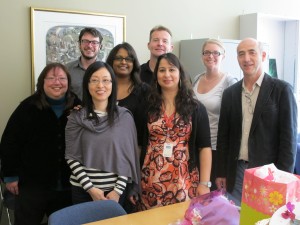Message from the Director’s Office to LSI Members:
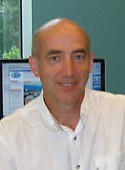 |
| Dr. Christian Naus |
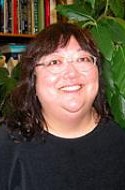 |
| Dr. Linda Matsuuchi |
This issue of the newsletter highlights the continuing research achievements of LSI members, including faculty, students and staff. These include both Faculty of Science and Medicine recognition for specific achievements, graduate and undergraduate student awards, major research grants, high impact publications and notable outreach events. We continue to develop and assist with additions to our research infrastructure.
This issue also acknowledges the contributions of colleagues who have left or will be leaving, in making the LSI and our departments a better place to do research. In particular we honor the retirement of Dr. Hung-Sia Teh and Soo Jeet Teh from the Dept of M&I in June, the retirement of Theresa Lung from being the LSI Administrator in May; and the leaving of LSC Operations Manager, Tim Morgan in April.
As we move forward with new initiatives to enhance our research, we value your contributions and partnership in continuing to make the LSI “a place of discovery”.
Christian and Linda
Announcements
Dr. Santiago Ramon-Garcia named “Canadian Rising Star in Global Health”
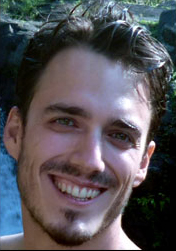 |
| Dr. Ramon-Garcia |
Centre for Tuberculosis Research (CTBR) researcher, Dr. Santiago Ramon-Garcia, created a two minute video to call attention to TB and visually explain his synergistic approach to treating TB. Videos from researchers across Canada were viewable on the Grand Challenges Canada website for voting as part of the rigorous review process. Santiago was awarded one of nineteen $100,000 Canadian Rising Stars in Global Health grants.
For more information and to view Dr. Ramon-Garcia’s video, click HERE.
MSFHR 2011 Career Investigator Awards Announced
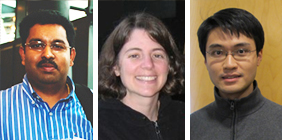 |
| Dr. Kizhakkedathu, Dr. Van Raamsdonk, Dr. Yip |
Dr. Jayachandran Kizhakkedathu, Centre for Blood Research, Department of Pathology and Laboratory Medicine, Dr. Calvin Yip, Diabetes Research Group, Department of Biochemistry and Molecular Biology, and Dr. Catherine Van Raamsdonk, Molecular Epigenetics Research Group, Department of Medical Genetics, have each received Michael Smith Foundation for Health Research Career Investigator awards.
“MSFHR’s Career Investigator Program builds research capacity in BC by supporting the establishment, development and retention of new and mid-career investigators. Since 2001, MSFHR has allocated more than $80 million in funding to more than 300 Career Investigator award recipients.”
For a full list of award recipients, or to learn more about the MSFHR, please visit their website.
Dr. Hung Sia Teh Retires
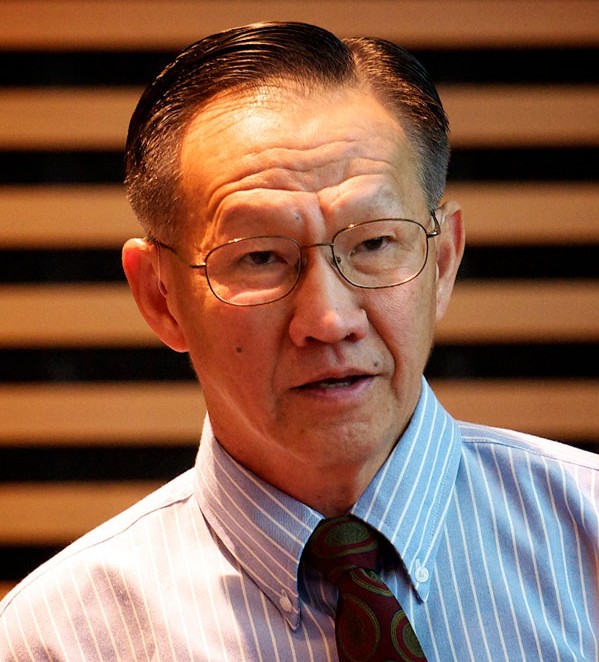 |
| Dr. Hung Sia Teh |
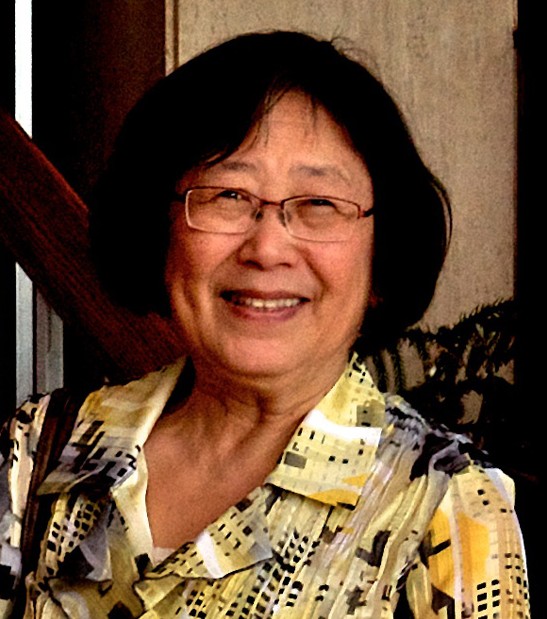 |
| Soo Jeet Teh |
June 13, 2011 – the Dept of Microbiology & Immunology celebrated, after 34 years at UBC, the retirement of Dr. Hung Sia Teh and Soo Jeet Teh. A symposium delivered by 4 of Hung Sia’s former trainees (Drs. Nicolai Van Oers, Rusun Tan, Christopher Ong and Salim Dhanji), was followed by a talk by Hung Sia that impressively summarized the substantial contributions of the Teh lab to T cell immunology. Also honored was Soo Jeet Teh, who has worked side-by-side with Hung Sia in the lab at UBC. The event ended with speeches and a reception at SAGE Bistro. The Department as well as Hung Sia’s LSI and UBC colleagues will miss his scientific acumen, advice and penetrating questions. All will miss both Hung Sia’s and Soo Jeet’s kindness, dedication to the Dept of Microbiology & Immunology and their combined efforts mentoring the new recruits. We wish them well as they travel the world during retirement.
LSI members win CIHR nanomedicine and regenerative medicine grants
 |
| Dr. Tim Kieffer |
 |
| Dr. Pieter Cullis |
March 2011 – Drs. Pieter Cullis, Chemical Biology of Disease Research Group, and the Department of Biochemistry and Molecular Biology, and Timothy Kieffer, Diabetes Research Group and the Department of Cellular & Physiological Sciences, are leading two of seven new research projects in regenerative medicine and nanomedicine that have received funding from the Canadian Institutes of Health Research and the Canadian Space Agency. Dr. Cullis’ project seeks to create personalized nanomedicines that silence cancer-causing genes. Dr. Kieffer’s work is focused on generating transplantable, insulin-producing cells from stem cells for diabetes treatment.
For more information on above projects, please click HERE.
2011 Faculty of Medicine Awards
May 2011 – Dr. Peter Cullis is this year’s recipient of the Bill and Marilyn Webber Lifetime Achievement Award, which recognizes extraordinary members of the Faculty of Medicine who have had sustained distinguished careers at UBC in the areas of research, teaching and/or service.
June 2011 – Dr. Tim Kieffer received the Faculty of Medicine Distinguished Achievement Award for Overall Excellence.
2011 Faculty of Science Achievement Awards
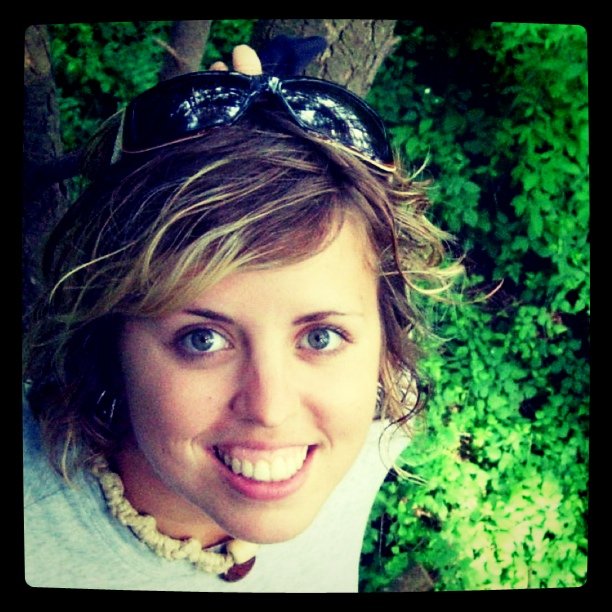 |
|
Jody Wright |
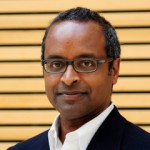 |
|
Dr. Ninan Abraham |
May 2011 – Congratulations to faculty member Dr. Ninan Abraham, Immunity, Inflammation & Infection Research Group and the Departments of Microbiology & Immunology and Zoology, and Hallam lab member Jody Wright, a PhD. candidate in the Graduate Program in Microbiology & Immunology, who were both recently named as recipients of the UBC Science Achievement Awards. Dr. Abraham received this award “for his extensive efforts and leadership role on the Centre for Disease Modelling (CDM) Users Committee. His efforts have ensured that CDM policies create an environment in which researchers can carry out their grant funded research.” Jody was recognized “for exceptional efforts in promoting science knowledge to students of all ages through interactive and diverse channels: courses, workshops, mentoring, tutoring, and social media.”
Lindsay Eltis and Bill Mohn lead $7.9 million Genome Canada Applied Research Project Grant
 |
| Dr. Bill Mohn |
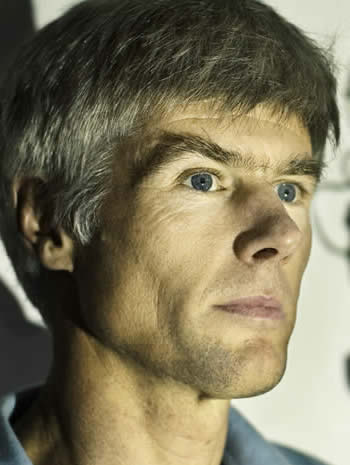 |
| Dr. Lindsay Eltis |
March 2011 – The Honourable Gary Goodyear, Minister of State for Science and Technology, made the announcement on March 25, 2011 of a $60 million investment in sixteen new Genome Canada applied research projects that will use genomics research to improve key sectors of the Canadian economy.
Drs. Lindsay Eltis and Bill Mohn, Bacterial Adaptatation & Response Networks Research Group and Professors in the Department of Microbiology & Immunology, are the recipients of one of the above sixteen grants entitled “Harnessing microbial diversity for sustainable use of forest biomass resources”. Other applicants include Drs. Steven Hallam, John Kadla, Jeremy Hall and Steven Withers. With funding from Genome Canada, these investigators are exploring the microorganisms found in soil that naturally degrade biomass. Unlocking the potential of forest biomass will lead to better forest management practices and improve the economics of lignin-based products. For more information on the Genome Canada applied research projects, please visit the Genome Canada Website.
2010 UBC Killiam Research Prize and 2011 Fellow of American Academy of Microbiology
Feb 2011 – Dr. Lindsay Eltis is the recipient of the Killiam Research Prize, awarded annually to full-time faculty members in recognition of outstanding research and scholarly contributions.
Dr. Eltis has also been elected as a Fellow of the American Academy of Microbiology awarded by the American Society for Microbiology.
Don Moerman renewed as CIFAR Fellow
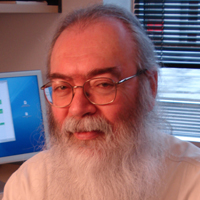 |
| Dr. Don Moerman |
Feb 2011 – The Canadian Institute for Advanced Research (CIFAR) announced a major new investment totaling approximately $6 million over five years to support the renewal of two of the Institute’s research programs in genetics, and economics and social sciences. Dr. Don Moerman, Cell & Developmental Biology Research Group and the Department of Zoology, was renewed for the next five years as a CIFAR fellow in Genetics . For a list of members and more information on the Genetic Networks Program please visit the CIFAR website.
Hugh Brock joins CFIS as Associate Principal
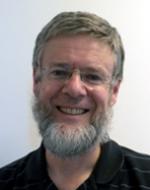 |
| Dr. Hugh Brock |
Feb 2011 – Dr. Hugh Brock, Molecular Epigenetics Research Group and the Department of Zoology, has been appointed Associate Principal at the College for Interdisplinary Studies (CFIS). Dr. Brock brings to CFIS a depth of experience in scientific research (his research area is developmental biology), administration (most recently as Director of the Genetics graduate program), and teaching. For more details on this announcement, click HERE.
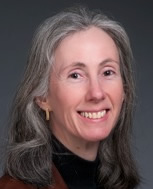 |
| Dr. Carolyn Brown |
Carolyn Brown Appointed Department Head of Medical Genetics.
Feb 2011 – The Faculty of Medicine announced the appointment of Dr. Carolyn Brown as Head, UBC Department of Medical Genetics, effective February 16, 2011 to June 30, 2016. In this partnership role, Dr. Brown has also been appointed Head, Provincial Health Services Authority, Department of Medical Genetics at BC Women’s Hospital & Health Centre. Dr. Brown was previously the leader of the Molecular Epigenetics Research Group. For more details on this announcement, click HERE.
Natalie Strynadka awarded Tier 1 Canada Research Chair
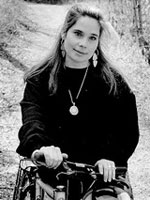 |
|
Dr. Natalie Strynadka |
Nov 2010 – Dr. Natalie Strynadka, Centre for Blood Research and the Department of Biochemistry & Molecular Biology, was awarded a Tier 1 Canada Research Chair in Antibiotic Discovery and Medicine. Dr. Strynadka’s research involves designing new therapies to overcome resistance to antibiotics. The increase in the number of hospital patients around the world who have become resistant to antibiotic treatments for their bacterial infections in recent years has become alarming. Several potentially deadly bacterial pathogens—including those that cause tuberculosis, skin and blood infections, and respiratory illness—have gained so-called “superbug” status. These superbugs can evade treatment by all the antibiotics that doctors have relied on for decades. Using a wide variety of biological approaches, Dr. Strynadka wants to understand at the molecular level how these notorious bugs resist antibiotics. She and her research team are also looking to identify molecular targets that allow bacteria and infections to thrive. For more information, please visit the CRC website.
Research
2011 – 2012 Visiting Scientist Award
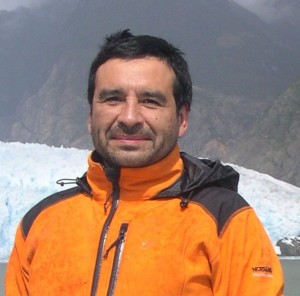
Dr. Osvaldo Ulloa
The deadline for the 2011 Visiting Scientist Award was May 31st, and the recipient of the award is Professor Osvaldo Ulloa, Professor of Biological Oceanography, University of Concepcion, Chile. He graduated from Dalhousie University with a M.Sc. in Marine Biology (1987) and a Ph.D. in Oceanography (1993), working with Dr. Trevor Platt on phytoplankton ecology, bio-optics of marine bacteria and sub-micrometer particles. He then went as a postdoctoral fellow to the Niels Bohr Institute, University of Copenhagen, where he worked with Prof. Gary Shaffer on the global carbon cycle. He returned to his native Chile in 1997, where he has been mainly working on the microbial ecology and biogeochemistry of the oxygen-deficient waters of the eastern South Pacific Ocean.
The current Visiting Scientist Dr. Timothy Machonkin gave a seminar entitled ‘Defining a Preference for Halogen substituents in a Ring-Cleaving Dioxygenase” on May 9th as part of the Biochemistry & Molecular Biology Discussion Group. To look up the recipients of the past LSI Visiting Scientist Awards, click HERE.
High Profile Scientific Papers
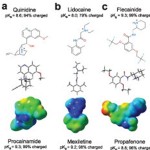 Molecular basis for class Ib anti-arrhymic inhibition of cardiac sodium channels
Molecular basis for class Ib anti-arrhymic inhibition of cardiac sodium channels
Published in Nature Communications, June 2011
Authors: Stephan A. Pless, Jason D. Galpin, Adam Frankel, Christopher A. Ahern
Cardiac sodium channels are established therapeutic targets for the management of inherited and acquired arrhythmias by class I anti-arrhythmic drugs (AADs). These drugs share a common target receptor bearing two highly conserved aromatic side chains, and are subdivided by the Vaughan-Williams classification system into classes Ia-c based on their distinct effects on the electrocardiogram. How can these drugs elicit distinct effects on the cardiac action potential by binding to a common receptor? The use of fluorinated phenylalanine derivatives tests whether the electronegative surface potential of aromatic side chains contributes to inhibition by six class I AADs. Surprisingly, the paper finds that class Ib AADs bind via a strong electrostatic cation–pi interaction, whereas class Ia and Ic AADs rely significantly less on this interaction. The data sheds new light on drug-target interactions underlying the inhibition of cardiac sodium channels by clinically relevant drugs and provide information for the directed design of AADs.
 DNA Methylation and SETDB1/H3K9me3 Regulate Predominantly Distinct Sets of Genes, Retroelements, and Chimeric Transcripts in mESCs
DNA Methylation and SETDB1/H3K9me3 Regulate Predominantly Distinct Sets of Genes, Retroelements, and Chimeric Transcripts in mESCs
Published in Cell Stem Cell, June 2011
Authors: Mohammad M. Karimi, Preeti Goyal, Irina A. Maksakova, Misha Bileny, Danny Leung, Jie Xin Tang, Yoichi Shinkai, Dixie L. Mager, Steven Jones, Martin Hirst and Matthew Lorincz
DNA methylation and histone H3 lysine 9 trimethylation (H3K9me3) play important roles in silencing of genes and retroelements. However, a comprehensive comparison of genes and repetitive elements repressed by these pathways has not been reported. This paper shows that in mouse embryonic stem cells (mESCs), the genes upregulated after deletion of the H3K9 methyltransferase Setdb1 are distinct from those derepressed in mESC deficient in the DNA methyltransferases Dnmt1, Dnmt3a, and Dnmt3b, with the exception of a small number of primarily germline-specific genes. Numerous endogenous retroviruses (ERVs) lose H3K9me3 and are concomitantly derepressed exclusively in SETDB1 knockout mESCs. Strikingly, ∼15% of upregulated genes are induced in association with derepression of promoter-proximal ERVs, half in the context of “chimeric” transcripts that initiate within these retroelements and splice to genic exons. Thus, SETDB1 plays a previously unappreciated yet critical role in inhibiting aberrant gene transcription by suppressing the expression of proximal ERVs.
DNA Synthesis Generates Terminal Duplications That Seal End-to-End Chromosome Fusions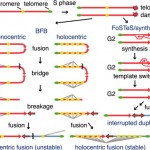
Published in Science, April 2011
Authors: Mia Rochelle Lowden (Department of Genetics, University of North Carolina, Chapel Hill, NC), Stephane Flibotte, and Donald G. Moerman, (University of British Columbia, Vancouver) and Shawn Ahmed (Department of Biology, University of North Carolina, Chapel Hill, NC).
End-to-end chromosome fusions that occur in the context of telomerase deficiency can trigger genomic duplicatons. For more than 70 years, these duplications have been attributed solely to breakage-fusion-bridge cycles. To test this hypothesis, Don and his colleagues examined end-to-end fusions isolated from Caenorhabditis elegans telomere replications mutants. Genome-level rearrangements revealed fused chromosome ends having interrupted terminal duplications accompanied by template-switching events.
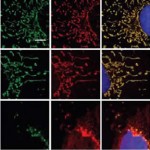 Autocrine motility factor/phosphoglucose isomerase regulates ER stress and cell death through control of ER calcium release
Autocrine motility factor/phosphoglucose isomerase regulates ER stress and cell death through control of ER calcium release
Published in the Journal of Cell Death and Differentiation, January 2011
Authors: Min Fu, Lei Li, Tobias Albrecht, James D. Johnson, Liliana D. Kojic and Ivan R. Nabi.
This study showed autocrine motility factor/phosphoglucose isomerase (AMF/PGI) promotes cell survival towards ER stress by regulating ER Ca2+ release, identifying novel roles for these cancer-associated proteins in promoting tumor cell survival.
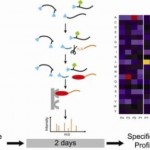 Characterization of the prime and non-prime active site specificities of proteases by proteome-derived peptide libraries and tandem mass spectrometry
Characterization of the prime and non-prime active site specificities of proteases by proteome-derived peptide libraries and tandem mass spectrometry
Published in Nature Protocols, January 2011
Authors: Oliver Schilling, Pitter F. Huesgen, Olivier Barré, Ulrich auf dem Keller and Christopher M. Overall.
Knowledge of the cleavage site specificity of a protease is important for development of specific detection assays and selective inhibitors. This paper presents a simplified and optimized proteomic method for the determination of protease cleavage site specificity on both prime-and non-prime side simultaneously using peptide libraries generated from whole proteomes.
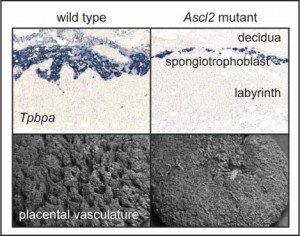 Partial loss of Ascl2 function affects all three layers of the mature placenta and causes intrauterine growth restriction
Partial loss of Ascl2 function affects all three layers of the mature placenta and causes intrauterine growth restriction
Published in Developmental Biology, January 2011
Authors: Rosemary Oh-McGinnis, Aaron B. Bogutz and Louis Lefebvre.
This paper describes a new deletion allele within a large cluster of imprinted genes which leads to a hypomorphic allele for Ascl2, a transcription factor essential for placental development and intestinal stem cell fate. Analysis of hypomorphic Ascl2 mouse conceptuses revealed that the function of Ascl2 is dosage sensitive and that reduced levels of Ascl2 lead to highly disorganized placentae with several different cell types being affected.
ImmunoVancouver 2011
The second ImmunoVancouver event was held in the LSC on June 7th. See http://immunovancouver.weebly.com/ for homepage and http://immunovancouver.weebly.com/program.html for the program details. This local research day involved a partnership with members from the UBC hospital sites, researchers at the Point Grey Campus, Simon Fraser University and the Deeley Cancer Center in Victoria. Dr. Mike Gold on behalf of the Dept of M&I and the Infection, Inflammation & Immunity Research Group along with Megan Levings, Dept of Surgery and The Child & Family Research Institute (CFRI), were the co-organizers. The event was supported by a CIHR meeting grant, in-kind support for the venue from the Life Sciences Institute and the Medical Undergraduate Program, as well as direct financial contributions from the Life Sciences Institute, Departments of Microbiology & Immunology, Biomedical Research Centre, CFRI, Immunity and Infection Research Centre (Vancouver General Hospital) and 4 Biotechnology companies (Stemcell Technologies, Miltenyi Biotec, eBioscience and BD Biosciences. Autoimmune diabetes was the special focus of this event with the keynote speaker coming from the Benaroya Research Institute in Seattle, Washington.
Research Infrastructure
New shared facilities
LSI Tissue Processing Facility
The facility housed in room 3435 on the 3rd floor of the LSC has a new Microm HM 525 Cryostat and a Olympus BX61 Motorized Fluorescence Microscope capable of digitally capturing histology images. This new shared facility is available to all LSI members at a modest fee, with training sessions for new users. A website with online booking system is now available. Individual logins to book the equipment are available after successful completion of training/orientation. Please contact Megan Gilmour at meg.gilmour@gmail.com to schedule an orientation/training session.
LSI TEM (Transmission Electron Microscopy) Facility
The TEM funded through Faculty of Medicine CFI and awarded to Drs. Bob Molday, Wayne Vogl and Nelly Pante has been installed in the B3 LSI Imaging Suite. The facility currently has 1 FEI Tecnai G2 Spirit Micrscope and 2 Ultramicrotomes, and is now available to LSI members. Please contact Dr. Wayne Vogl for access to the facility. For more information, please visit the TEM webpage on the LSI Facilities Website.
ASTRID Update
The Advanced Structural Biology for Re-emerging Infectious Diseases (ASTRID) is a research network centered in the LSI. The goal is to elucidate the structural basis for the complex protein interactions that underlie the mechanisms of bacterial pathogenesis. ASTRID will place particular emphasis on the structural biological studies of three bacterial pathogens of immediate health concern: methicillin resistant Staphylococcus aureus (MRSA), Pseudomonas aeruginosa, and Mycobacterium tuberculosis. In the last CFI leading edge competition, ASTRID received funding for the development of (i) a high-field NMR Spectroscopy Unit; (ii) a X-ray Crystallography Unit; and (iii) a Bio-analytical Unit. Installation of these units is well underway with completion expected by late fall. At present, a new X-ray generator with a CCD imaging system is operational in core facility area of the LSC to enable data collection from crystals of macromolecules. Also available is an instrument to measure molecular weight and monodispersity of macromolecules in solution by dynamic light scattering in a plate reader format and a small volume isothermal calorimeter (ITC).Contact Mike Murphy for more details.
Training
LSI-GSA Research Day – March 11th, 2011
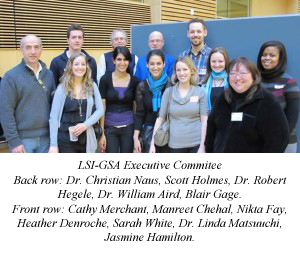 The 5th annual LSI-GSA Research Day was held during Celebrate Research Week on Friday, March 11, 2011. The event, which attracted a record number of presenters and attendees, included internationally renowned keynote speakers, a poster session, trainee talks, and an awards ceremony and a social.
The 5th annual LSI-GSA Research Day was held during Celebrate Research Week on Friday, March 11, 2011. The event, which attracted a record number of presenters and attendees, included internationally renowned keynote speakers, a poster session, trainee talks, and an awards ceremony and a social.
A total of 85 research posters and 16 student talks were presented. This was the first year that the LSI Sponsored awards for undergraduate research posters. Graduate Students were divided into Junior and Senior divisions and awards were given to the top presentations in each category.
Invited speakers are nominated and voted on by graduate students and this year the GSA invited Dr. Robert A. Hegele and Dr. William C. Aird. Dr. Hegele is the Director of the Blackburn Cardiovascular Genetics Lab at the Robarts Research Institute. His laboratory focuses on research on the genetic basis of diabetes, atherosclerosis, hypertension and obesity and has discovered the molecular genetic basis of 12 human diseases. Dr. Aird is Director of the Center for Vascular Biology Research at Beth Israel Deaconess Medical Center. His research involves the study of vascular biology, specifically understanding how endothelial cell phenotypes are differentially regulated in space and time.
The LSI-GSA Research day was sponsored by generous donations from the following:
The Diabetes Research Group,
The Centre for Blood Research,
Infection, Inflammation & Immunity Research Group
Bacterial Adaptation & Response Networks Research Group
Molecular Epigenetics Research Group and
The Post-Doc Association
Winners:
| Junior Talk: Best – Michael Bround (Johnson Lab) Graduate Program in Cell & Developmental Biology Runner-up – Kasper Podgorski (Haas Lab) Graduate Program in NeuroscienceHon. Mention – Benjamin Martin (Howe Lab) Graduate Program in Biochemistry & Molecular Biology Poster Junior: Runner-up – Tobias Albrecht (Johnson Lab) Hon. Mention – Jan Burian (Thompson Lab) |
Senior Talk: Best – Stephanie Ellis (Tanentzapf Lab) Graduate Program in Cell & Developmental Biology Runner-up – Kevin Eade (Allan Lab) Graduate Program in Cell & Developmental BiologyHon. Mention – Sarah Chow (Accili Lab) Graduate Program in Physiology Poster Senior: Runner-up – Spencer Freeman (Gold Lab) Hon. Mention – Sara Farahabadi (Richman Lab) |
Undergraduate Awards Javier Vela (Kieffer Lab)Frank Frazier (Mauk Lab)
Mark Lee (Van Petegem Lab) |
3 Minute Thesis (3MT)
3MT is an academic competition that assists graduate students to develop effective presentation and communication skills. Presenters are required to distill their thesis into an engaging 3 minutes highlighting the significance and ensuring it is comprehensible to a non-specialized audience. Developed at the University of Queensland in 2008, UBC is one of the first universities in North America to host 3MT.
The College for Interdisciplinary Studies (CFIS) kicked off the qualifying heats with the Faculties of Forestry, Medicine, Applied Science, and the Department of Statistics throughout March and April. The LSI heat, April 14th, was the last chance to qualify for the UBC semi finals. Ten students in the LSI heat were competing for 1st, 2nd, & 3rd place as well as a chance to advance to the UBC Semi Finals. The judging panel consisted of Dr. Jennifer Gardy, Dr. David Ng and Bill Hanegraaf. All LSI students did a fantastic job making the judges decisions very difficult. Three LSI students made the semi finals – Leah Lim, Sarah Chow and John Shin. Sarah Chow hit the mark and took first place in her semi final heat. Leah Lim also advanced to the finals with a second place finish in her semi-final heat. On May 10th we were down to the last 6; with 2 from the LSI. Both Sarah and Leah gave thoroughly engaging and exciting talks. In the end Leah Lim took for 3rd Prize from the 1st Annual UBC 3MT Competition.
We look forward to participating and expanding this event with Graduate Pathways for Success next year. For more information on 3MT, check out the LSI Grad Studies 3MT webpage.
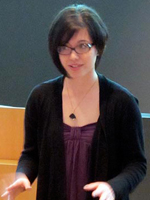 |
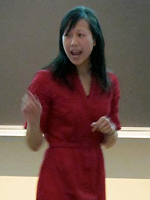 |
 |
| 1st place Leah Lim, Thompson Lab, Graduate Program in Microbiology & Immunology |
2nd place Sarah Chow, Accili Lab, Graduate Program in Physiology |
3rd place John Shin, Loewen Lab, Graduate Program in Cell & Developmental Biology |
CELLS Seminar Series
 Established in May, the CELLS Seminar series aims to provide more opportunities for CPS and CELL Program trainees to share their work and receive feedback from their peers and LSI Principle Investigators. It also helps students to establish and maintain connections throughout the training experience.
Established in May, the CELLS Seminar series aims to provide more opportunities for CPS and CELL Program trainees to share their work and receive feedback from their peers and LSI Principle Investigators. It also helps students to establish and maintain connections throughout the training experience.
The latest seminar took place on June 17th and revolved around the theme “Adhesion and Development.” Talks were given by Lindsay Petley-Ragan (Auld lab): “The role of glial cells and the extracellular matrix in the development of the Drosophila peripheral nervous system,” Ellie Young (Vogl lab): “Intercellular Junction Disassembly in Testis,” and Mary Pines (Tanentzapf lab): “Tensile force regulates the stability of the integrin adhesion complex.”
The series is sponsored by the CELL Program and has received faculty help by way of Dr. John Church and Dr. Chris Loewen. The series is currently being organized by LSI students Spencer Freeman and Stephanie Ellis.
The next CELLS Seminar is scheduled for Thursday July 7th and students interested in speaking can contact Spencer at spencerfreeman@gmail.com or Stephanie at stephanie.j.ellis@gmail.com.
 Year of Science grant to organize a 2nd CSI @ LSI.
Year of Science grant to organize a 2nd CSI @ LSI.
The BC Ministry of Sciences and University has declared 2010-2011 academic year to be the Year of Science (www.yearofsciencebc.ca), the goals being to encourage and promote interest, involvement, and increased literacy in science and technology.
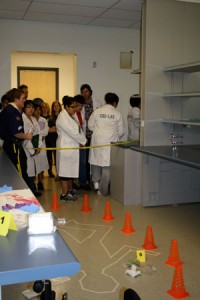 In March UBC received a Year of Science grant to support a second CSI@LSI for a school that was not from the greater Vancouver metropolitan area. This allowed the LSI-GSA to host the Bella Bella Community school from Queen Charlotte island off the coast of BC. This class had the opportunity to travel to the LSI, stay overnight in a UBC dormitory, and participate in an expanded CSI@LSI with more hands-on time in the labs.
In March UBC received a Year of Science grant to support a second CSI@LSI for a school that was not from the greater Vancouver metropolitan area. This allowed the LSI-GSA to host the Bella Bella Community school from Queen Charlotte island off the coast of BC. This class had the opportunity to travel to the LSI, stay overnight in a UBC dormitory, and participate in an expanded CSI@LSI with more hands-on time in the labs.
On Friday May 27th, 19 grade 10 science students were presented the case of the “murder of Eve Hill”. Students worked their way through 6 different modules over the next two days including Mass Spectrometry, Electron Microscopy, Microbiology, DNA sequencing, and Immunofluorescent imaging. With each module students eliminated a suspect to ultimately identify the murderer.
While here, students were also given a campus tour, which included the First Nations Long House, and a visit to the Museum of Anthropology. This was the first time on UBC campus for many of the students. BBCS is recognized as one of the best native schools in BC. (B.C. native school a world apart – a much better world) with over half the class planning on attending University after graduating.
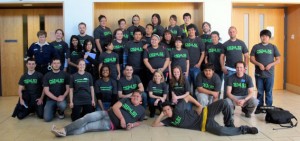 LSI members presented BBCS with textbooks, microscopes, slides, and pipettes to help facilitate the teachers and students of Bella Bella to continue exploring their interest in science. Thank you to Drs. Abraham, Vogl, Matsuuchi, the Department of Cellular and Physiological Sciences and the LSC Stores for the donations.
LSI members presented BBCS with textbooks, microscopes, slides, and pipettes to help facilitate the teachers and students of Bella Bella to continue exploring their interest in science. Thank you to Drs. Abraham, Vogl, Matsuuchi, the Department of Cellular and Physiological Sciences and the LSC Stores for the donations.
Photo album of event photos available on ![]() here.
here.
LSI Café Scientifique
 The 2011 LSI Café Scientifiques are supported by the Michael Smith Foundation for Health Research (MSFHR) and matching funds from the Faculties of Medicine and Science at UBC and continues to attract the public in large numbers. It also grabbed a well deserved profile on the MSFHR online newsletter.
The 2011 LSI Café Scientifiques are supported by the Michael Smith Foundation for Health Research (MSFHR) and matching funds from the Faculties of Medicine and Science at UBC and continues to attract the public in large numbers. It also grabbed a well deserved profile on the MSFHR online newsletter.
The Café Scientifique “Memories in your Genes?” on March 29th was presented by the Molecular Epigenetics (MEG) Research Group and included talks from Drs. LeAnn Howe, Louis Lefebvre and Carolyn Brown. There are some 3 billion basepairs of DNA in each cell of your body, yet cells remember how they have been instructed to act – make an eye or make a kidney. Epigenetics is the study of the identifying marks that are placed on the packaged DNA that are passed on through cell divisions – and sometimes even through generations.
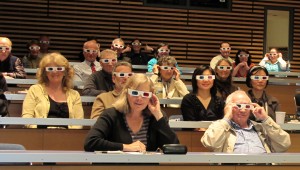 The Café on May 17th entitled “E-natomy – How digital Anatomy has changed the way we teach and practice medicine” featured two members of the Faculty of Medicine who use digital anatomy in teaching medical students and in clinical practice. This interactive session was presented by Dr. Claudia Krebs, a Senior Instructor in the Department of Cellular & Physiological Sciences, and Dr. Savvas Nicolaou, Associate Professor and Director of Emergency Radiology, practicing at the Vancouver General Hospital. Drs. Krebs and Nicolaou each explained how the advances in whole body imaging have changed the way students learn anatomy and how patients are treated in the ER. Real-life examples of digital anatomy’s role in teaching as well as in practice were shown and the power of CT scans, MRIs and ultrasound scans compared with traditional x-rays was explained.
The Café on May 17th entitled “E-natomy – How digital Anatomy has changed the way we teach and practice medicine” featured two members of the Faculty of Medicine who use digital anatomy in teaching medical students and in clinical practice. This interactive session was presented by Dr. Claudia Krebs, a Senior Instructor in the Department of Cellular & Physiological Sciences, and Dr. Savvas Nicolaou, Associate Professor and Director of Emergency Radiology, practicing at the Vancouver General Hospital. Drs. Krebs and Nicolaou each explained how the advances in whole body imaging have changed the way students learn anatomy and how patients are treated in the ER. Real-life examples of digital anatomy’s role in teaching as well as in practice were shown and the power of CT scans, MRIs and ultrasound scans compared with traditional x-rays was explained.
Please visit the LSI Café Scientifique website for information on the upcoming as well as past cafés.
__________________________________________________________________________________________________________________________________________________________________________________
Nan Cheney Art book
Nan Cheney was a respected and renowned artist and contemporary of Emily Carr. She was also a medical illustrator in the Department of Anatomy at UBC from 1951 to 1956 and the Department of Cellular & Physiological Sciences currently owns over fifty original works of art by her, some of which are exhibited in the LSC Colonnade. Her artwork has intrinsic value for its beauty, for what it shows about her artistic skill and as a reminder of an art discipline that has been supplanted by modern technology. Dr. Claudia Krebs, with Monika Fejtek, created a photo book from Nan Cheney’s orginal art. Copies of the photobook were given as thank you gifts to the donors who provided funds to frame and display the artwork (Justice Grant Burnyeat, Mrs. Marilyn Webber, Dr. Sydney Friedman and Dr. Kenneth Morton).
__________________________________________________________________________________________________________________________________________________________________________________
Quest University visits the Mackie Lab
Annie Prud’homme-Genereux, an alumnus of the Department of Biochemistry and Molecular Biology department and the Mackie Lab, brought to the LSI her Molecular Techniques class from Quest University, where she is now a faculty member. The group of 3rd and 4th year students spent an afternoon with Dr. Mackie and current MSc student Alex Wong discovering the LSI research environment.
__________________________________________________________________________________________________________________________________________________________________________________
Chief Albert Wright high school students in the Thompson Lab
On May 18th, the LSI and the Thompson Lab welcomed 3 students from the Northwest Territories – Chief Albert Wright School. The students spent time exploring the Thompson Lab (Microbiology & Immunology) with graduate students Leah Lim and Carol Ng, who assisted them in microbiology techniques involved in identifying bacteria morphology.
__________________________________________________________________________________________________________________________________________________________________________________
Others
Mitacs
Mitacs is a not-for-profit organization linking University Research with Industry partners, and has numerous programs aimed at all stages of an academic career, from high-school to post-doc. LSI graduate students have previously attended the Mitacs Step, a workshop on skills enhancement focused on key areas such as Project Management, Communication, and Basics of Business Environment. The LSI is enthusiastic about the opportunities Mitacs has provided and continue to provide for our trainees.
After a successful pilot in Ontario the Elevate program is coming to BC. Mitacs Elevate is a Post Doctoral Fellowship program for new PhDs. Based on Mitacs philosophy of matching academics with industry partners, post-docs split their time between an academic lab, industrial lab and the skill enhancement workshops. Elevate is an opportunity for academic post-docs to explore industry for a possible career option. On May 25th, the UBC-Post Doc Association and the LSI hosted an Information Session on the Elevate Program.
Theresa Lung’s Farewell
On May 18th we said goodbye to a long standing member of the LSI admin office. Theresa Lung made the enviable decision to return to her family in Hong Kong and retire. Good luck Theresa, you are already missed!
Pictured: Back Row: Max Mitchell Pierre Tanguay Middle Row: Linda Matsuuchi, Sharda Muni, Kelsey Mauch Front Row: Theresa Lung, Neera Vohra, Christian Naus
 Tim Morgan’s Farewell
Tim Morgan’s Farewell
Tim was one of the longest standing employees in the Life Science Centre and his expertise and dedication was greatly appreciated. LSI invited Tim back for a farewell on May 11. He was also invited and honored by the Department of Microbiology & Immunology on May 5th with a thank you party.
We all wish him the best of luck in the future.
Pictured: Pierre Tanguay, Bill Hannegraf, Tim Morgan and Rod Hanning
Farewell Chris Boucher
 A loss for the Faculty of Medicine and for Vancouver, Chris Boucher has decided to relocate back to Ontario along with his partner Colleen, also a UBC development colleague, to be close to their families. During his two years working for the development team, Chris made significant contributions to fundraising for the life sciences and cancer portfolios, and developed strong rapport with many of you. Please join us in wishing Chris all the best as he ventures on to the London Health Sciences Foundation to direct their major gifts program and upcoming capital campaign. Chris’s last day at UBC will be July 29th.
A loss for the Faculty of Medicine and for Vancouver, Chris Boucher has decided to relocate back to Ontario along with his partner Colleen, also a UBC development colleague, to be close to their families. During his two years working for the development team, Chris made significant contributions to fundraising for the life sciences and cancer portfolios, and developed strong rapport with many of you. Please join us in wishing Chris all the best as he ventures on to the London Health Sciences Foundation to direct their major gifts program and upcoming capital campaign. Chris’s last day at UBC will be July 29th.
New Wing Manager – Gord Stewart
Gord is now the Wing Manager of 4E and is a member of the Mohn lab. Gord is located in Room 4520 and can be reached by phone at 604-822-5646 or by email at grs@interchange.ubc.ca.
__________________________________________________________________________________________________________________________________________________________________________________
2011 LSI Golf Tournament
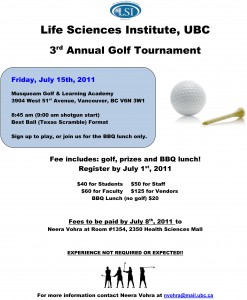 The third annual LSI Golf Tournament will be on Friday July 15th, 2011. The cost is very reasonable, and includes a BBQ lunch. First time golfers and experienced golfers are all welcome to participate!
The third annual LSI Golf Tournament will be on Friday July 15th, 2011. The cost is very reasonable, and includes a BBQ lunch. First time golfers and experienced golfers are all welcome to participate!
Please RSVP to Neera Vohra by July 1 , 2011 at nvohra@mail.ubc.ca

